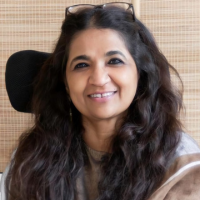Politics
Pioneering Change: Disability Representation Gains Ground in India

India is witnessing a significant shift in the political landscape for persons with disabilities (PwDs), a group that numbers over 2.68 crore according to the 2011 Census. This demographic has historically been marginalized in political discourse and representation. Recent developments, however, signal a growing recognition of their rights and a movement towards greater inclusion in political structures.
Until the 1990s, the prevalent view of disability in India largely stemmed from charity-based models, which treated PwDs as mere beneficiaries of welfare rather than as stakeholders in democracy. The initial legal frameworks, including the Mental Health Act (1987) and the Persons with Disabilities Act (1995), provided no mechanisms for political inclusion or representation. The narrative began to shift in the 1990s, influenced by global movements advocating for rights-based frameworks and local activism led by Disabled People’s Organisations (DPOs).
The introduction of the Persons with Disabilities (Equal Opportunities, Protection of Rights and Full Participation) Act marked a pivotal moment, yet it primarily focused on education and employment rather than political engagement. As the disability rights movement evolved, advocates turned their attention towards ensuring not only access to voting but also a voice in governance.
From Rights to Representation
By the early 2000s, DPOs began to advocate for accessible elections, seeking improvements such as Braille-enabled electronic voting machines and wheelchair access at polling stations. While these efforts yielded some positive outcomes, including the 2018 launch of the ECI’s ‘Accessible Elections’ initiative, they did not translate into significant political representation for PwDs. Despite improved voting access, few PwDs contested elections, and even fewer were supported by mainstream political parties.
The Rights of Persons with Disabilities (RPwD) Act, 2016 expanded the definition of disability to include 21 categories but again fell short in addressing political representation. Activists, including those from the National Platform for the Rights of the Disabled (NPRD), emphasized this missing component, arguing that true inclusion in a democracy must encompass political leadership.
A groundbreaking change occurred in 2019 when Chhattisgarh became the first Indian state to legislate mandatory representation for PwDs in rural governance. The amendment to the Panchayati Raj Act requires at least one PwD in every gram panchayat, either through election or nomination. This reform is expected to empower over 11,000 PwDs in grassroots leadership roles, eliminating structural barriers to political participation.
A New Era of Political Engagement
The 2019 Lok Sabha elections saw an increase in registered voters with disabilities, from 62.6 lakh to 77.4 lakh by 2021. Despite these gains, mainstream parties continued to field only token candidates from this demographic. Nevertheless, a growing public demand for political reservation for PwDs has emerged, with calls for legislative measures similar to those for Scheduled Castes, Scheduled Tribes, and Other Backward Classes.
The momentum continued into 2025, when Tamil Nadu received a record 4,398 nominations from PwDs for local governance positions under the Tamil Nadu Panchayats (Second Amendment) Act. This legislation mandates at least one nominee from the PwD community in every village panchayat and district panchayat, marking a significant step towards meaningful political engagement.
Despite these advancements, there remains a stark absence of disabled women in politics. The compounded barriers of ableism and patriarchy have rendered them nearly invisible in electoral spaces. With over 11 million women living with disabilities in India, their exclusion from political representation is a pressing concern. Social stigma, safety issues, and a lack of accessible education continue to hinder their participation.
Political parties often shy away from nominating women with disabilities, citing concerns over electability. This pattern perpetuates a cycle of exclusion that requires urgent attention and reform.
The political landscape remains fraught with challenges for PwDs. While election manifestos may include commitments to gender and employment issues, disability rights are often sidelined. Major political parties have yet to establish dedicated disability wings or leadership development programs, leading to a culture of tokenism rather than genuine inclusion.
Advocates argue that true political representation for PwDs is crucial not only for equitable governance but also for challenging societal stigma and changing public perceptions. Their presence in leadership roles can help ensure that policies across education, healthcare, and labor rights are inclusive from the outset.
As India navigates this evolving political terrain, the call for robust advocacy and structural reforms remains vital. The journey towards meaningful representation for PwDs is ongoing, and it demands a collective commitment to addressing these enduring disparities.
-

 World5 months ago
World5 months agoSBI Announces QIP Floor Price at ₹811.05 Per Share
-

 Lifestyle5 months ago
Lifestyle5 months agoCept Unveils ₹3.1 Crore Urban Mobility Plan for Sustainable Growth
-

 Science4 months ago
Science4 months agoNew Blood Group Discovered in South Indian Woman at Rotary Centre
-

 World5 months ago
World5 months agoTorrential Rains Cause Flash Flooding in New York and New Jersey
-

 Top Stories5 months ago
Top Stories5 months agoKonkani Cultural Organisation to Host Pearl Jubilee in Abu Dhabi
-

 Sports4 months ago
Sports4 months agoBroad Advocates for Bowling Change Ahead of Final Test Against India
-

 Science5 months ago
Science5 months agoNothing Headphone 1 Review: A Bold Contender in Audio Design
-

 Top Stories5 months ago
Top Stories5 months agoAir India Crash Investigation Highlights Boeing Fuel Switch Concerns
-

 Business5 months ago
Business5 months agoIndian Stock Market Rebounds: Sensex and Nifty Rise After Four-Day Decline
-

 Sports4 months ago
Sports4 months agoCristian Totti Retires at 19: Pressure of Fame Takes Toll
-

 Politics5 months ago
Politics5 months agoAbandoned Doberman Finds New Home After Journey to Prague
-

 Top Stories5 months ago
Top Stories5 months agoPatna Bank Manager Abhishek Varun Found Dead in Well









